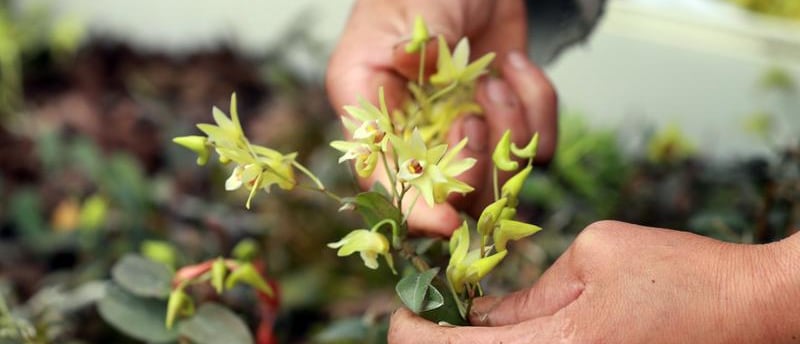Unlocking the Secrets of Dendrobium Officinale: An Orchid with a Rich Ethnobotanical Legacy
Rui Li
4/1/20243 min read


Unlocking the Secrets of Dendrobium Officinale: An Orchid with a Rich Ethnobotanical Legacy
The world of plants is filled with wonders, and one such marvel is the Dendrobium officinale. This exquisite orchid, native to Asia, has captivated botanists, herbalists, and researchers for centuries. With its delicate beauty and fascinating medicinal properties, Dendrobium officinale is truly a treasure worth exploring.
A Brief Overview of Dendrobium Officinale
Dendrobium officinale, also known as the "Shi Hu" orchid in traditional Chinese medicine, is a species of orchid that belongs to the family Orchidaceae. It is primarily found in the mountainous regions of China, Japan, Korea, and other parts of Southeast Asia. This orchid is known for its unique appearance, with slender stems and vibrant flowers that range in color from white to pink.
What sets Dendrobium officinale apart from other orchids is its rich ethnobotanical legacy. For centuries, it has been used in traditional Chinese medicine for its various therapeutic properties. The orchid is believed to have a cooling effect on the body and is often used to nourish Yin and promote fluid production.
The Medicinal Benefits of Dendrobium Officinale
The medicinal properties of Dendrobium officinale have been extensively studied and documented. This orchid contains a wide range of bioactive compounds, including alkaloids, flavonoids, polysaccharides, and phenols, which contribute to its therapeutic effects.
One of the key benefits of Dendrobium officinale is its potential to enhance the immune system. Research has shown that the orchid extract can stimulate the production of immune cells and increase the activity of natural killer cells, which play a crucial role in fighting off infections and diseases.
In addition to its immune-boosting properties, Dendrobium officinale has also been found to have antioxidant and anti-inflammatory effects. The orchid extract contains antioxidants that help protect cells from oxidative damage, reducing the risk of chronic diseases such as heart disease and cancer. Its anti-inflammatory properties make it a valuable herb for alleviating pain and reducing inflammation in conditions such as arthritis.
Furthermore, Dendrobium officinale has been traditionally used to improve gastrointestinal health. It is believed to have a positive effect on digestion and can help relieve symptoms such as indigestion, bloating, and diarrhea. The orchid extract has also been studied for its potential anti-ulcer properties, which may be beneficial for those suffering from gastric ulcers.
Current Research and Future Potential
While Dendrobium officinale has a long history of use in traditional medicine, current research is shedding new light on its potential applications. Scientists are exploring its effects on various health conditions and investigating its active compounds to unlock its full therapeutic potential.
One area of research is the orchid's potential as an anti-cancer agent. Studies have shown that Dendrobium officinale extract can inhibit the growth of certain cancer cells and induce apoptosis, or programmed cell death. This opens up possibilities for developing new cancer treatments or complementary therapies.
Another area of interest is the orchid's effects on cognitive function. Preliminary studies have suggested that Dendrobium officinale may have neuroprotective properties and could potentially be used to improve memory and cognitive performance. Further research is needed to fully understand its mechanisms of action and potential applications in neurodegenerative diseases.
As research continues, Dendrobium officinale holds promise as a source of novel therapeutic compounds. Its unique blend of bioactive compounds makes it a valuable resource for drug discovery and development. By unlocking the secrets of this orchid, we may uncover new treatments for a wide range of health conditions.
Conclusion
Dendrobium officinale, with its rich ethnobotanical legacy and remarkable medicinal properties, is a true marvel of the plant world. From its immune-boosting effects to its potential as an anti-cancer agent, this orchid has captured the attention of researchers and herbalists alike. As we continue to explore its secrets, we may unlock new treatments and therapies that could benefit countless individuals. The legacy of Dendrobium officinale is a testament to the power of nature and the untapped potential that lies within.
